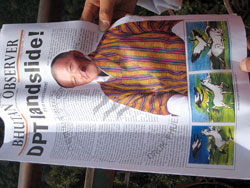|
|
Five generations of royal rule ended on Monday as Bhutan became the world's newest democracy, but the change is unlikely to resolve the plight of 110,000 Bhutani refugees living in Nepal for the past 17 years.
Voters had a choice of two political parties from which to pick 47 members of a lower house. The Druk Phuensum Tshogpa party (DPT) won a landslide over opponents from the People's Democratic Party (PDP), winning all but three seats.
Because election rules stipulate that voters could only cast ballots in the place of their birth, the capital Thimphu was almost deserted on Tuesday. Elections officials declared that 79.4 percent of the country's 318,000 registered voters cast ballots.
One businessman in Thimpu said he was only voting because his king had asked him to, and that he feared the country will "become unstable as our neighbours".
In December 2006 King Jigme Singye Wangchuck abdicated in favour of his son, 28-year-old Oxford-educated Jigme Khesar Namgyel Wangchuck.
Both parties had campaigned on the 'Gross National Happiness' plank, the former king's blueprint for development that seeks to balance material progress with spiritual well-being.
International election observers said the similar platforms of the two parties did not offer voters a real choice between two clear ideological alternatives. The result therefore was a surprise because most expected a 50-50 result.
"People voted rather conservatively, supporting the party which offers strong leadership and experience," said Tenzin Rigden of the private newspaper, Bhutan Times. The parties nominated 10 women candidates out of a total of 94. Four were elected.
The challenges ahead for Bhutan are to lift one-fifth of the population out of poverty, tackle youth unemployment that has risen sharply. Many officials quietly worry that corruption, already a problem, will spike with elected politicians.
The most delicate issue, however, is of the Nepali-speaking Lhotsampas. Lila Pradhan, 44, from DPT was the only woman among 19 Lhotsampa candidates, and won from the southern Samtse district.
Asked about the refugee problem, Pradhan told Nepali Times: "It is an important issue and our political manifesto states that we will look for a lasting solution to the problem, but first we need to form the government and look into our priorities."
Another Lhotshampa politician, 45-year-old N L Rai who won his seat in Sarpang dared to be only a little more specific: "We will be working with international organisations in order to find a speedy and durable solution. We are all Bhutanis and do not have the same ethnic issues as Nepal does in their elections," Rai said.
Since January, Bhutan's Maoists (United Revolutionary Front of Bhutan) have set off ten blasts. Police blamed militant groups operating out of Nepal. Bhutani refugees in exile do not regard this week's elections as democratic, saying many Lhotsampas were prevented from voting.
The Election Commission of Bhutan (ECB) had imposed strict rules and candidates couldn't discuss issues like citizenship, so the 'Southern problem' was not allowed to be a campaign topic.
The EU Election Observation Mission in its preliminary statement on Wednesday noted that "the exclusion of civil society organisations from engaging in activities related to the election process deprived the Bhutanese voters of a key source of independent information".
However, the election process was said to meet "international standards in general" and provide "solid foundation for a credible democracy".
As Lila Pradhan said: "Now we have to learn how to govern and build the nation."



